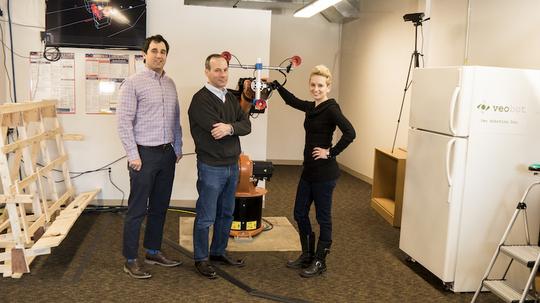
While the debate continues over how much of an impact robotics and automation will have on human jobs, Veo Robotics is betting on a different kind of future: a close and fluid collaboration between humans and machines.
With a system designed to give factory robots awareness of the human workers around them, the Cambridge startup has raised a $12 million Series A funding round led by GV (formerly known as Google Ventures) and Lux Capital. The round, which was announced on Wednesday, also included participation from Next47, a venture capital firm created by industrial manufacturing giant Siemens. Bilal Zuberi of Lux Capital and Andy Wheeler of GV have joined the company's board of directors with the new financing.
Patrick Sobalvarro, Veo's CEO and co-founder, told BostInno that the company's system is designed for existing factory robots used by manufacturers. The goal is to increase a factory's productivity and decrease downtime by making it safe for human workers to collaborate more closely with robots.
"Our ultimate vision is to make the entire factory human-aware," said Sobalvarro, who was an early employee at Rethink Robotics, the manufacturing robotics company started by iRobot founder Rodney Brooks. "In an environment like that, humans can move very fluidly from station to station, and you end up with much greater efficiencies."
Human-machine collaboration has already been a fact-of-life for many manufacturers, but without a system like Veo's, these machines often need to be shut off if a worker needs to get in close enough to, for example, replenish a fastener. In the case of a shutdown, however brief, it can cost manufacturers significantly — in some cases $50,000 a minute, Sobalvarro said. Machines can also be caged off, which can, for instance, lead to increased maintenance time.
These current limitations in factories can lead to what Sobalvarro calls "unnecessary automation." This happens when an automated process is rigged together because it's safer than having a human do it. At the same time, it creates inefficiencies because the assembly isn't used frequently and the way it's set up makes it difficult for future modifications to be made if the manufacturer changes the kind of parts it uses.
With Veo, Sobalvarro wants to put an end to that because he believes the intelligence, judgement and dexterity of humans, combined with the strength, repeatability and tirelessness of machines, can do a better job overall.
Sobalvarro founded Veo with Clara Vu, who previously co-founded Harvest Automation after working at iRobot as an early employee and senior software engineer, and Scott Denenberg, who was previously a senior director of electrical engineering at Jentek Sensors. Before Solbalvarro worked at Rethink Robotics, he led and founded IntelliVid Corporation, a video analytics software provider for retailers that he sold to Tyco International in 2018.
This is really a number one job for us. We're nothing if we're not safe."
While the company's commercial launch isn't expected until 2019, Veo is already working with automotive manufacturers, consumer packaged goods companies, major household appliance manufacturers and automated distribution centers.
Veo's system uses a combination of 3D sensors and algorithms running on parallel computing hardware to constantly track the distance between every part of a human's body and the robot, along with what it's carrying. It also makes projections for every possible position a human could be in the robot's surroundings. When the system senses a human is getting too close, the robot will stop immediately, even if it's carrying a heavy load.
With a system proposed to make close human-machine collaboration safe, the stakes for Veo are very high. All it would take is one system failure that results in human injury or worse for the company to become embroiled in controversy.
Sobalvarro said safety has been ingrained in the company since its very beginning and that it has been working with international safety standards organizations to ensure its systems are rigorously tested and heavily documented.
"This is really a number one job for us," Sobalvarro said. "We're nothing if we're not safe."








